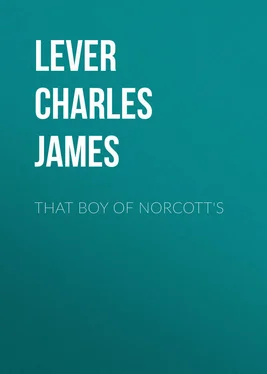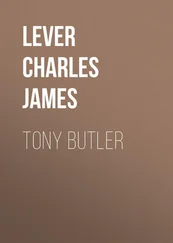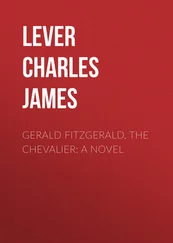Charles Lever - That Boy Of Norcott's
Здесь есть возможность читать онлайн «Charles Lever - That Boy Of Norcott's» — ознакомительный отрывок электронной книги совершенно бесплатно, а после прочтения отрывка купить полную версию. В некоторых случаях можно слушать аудио, скачать через торрент в формате fb2 и присутствует краткое содержание. Издательство: Иностранный паблик, Жанр: literature_19, foreign_antique, foreign_prose, на английском языке. Описание произведения, (предисловие) а так же отзывы посетителей доступны на портале библиотеки ЛибКат.
- Название:That Boy Of Norcott's
- Автор:
- Издательство:Иностранный паблик
- Жанр:
- Год:неизвестен
- ISBN:нет данных
- Рейтинг книги:4 / 5. Голосов: 1
-
Избранное:Добавить в избранное
- Отзывы:
-
Ваша оценка:
- 80
- 1
- 2
- 3
- 4
- 5
That Boy Of Norcott's: краткое содержание, описание и аннотация
Предлагаем к чтению аннотацию, описание, краткое содержание или предисловие (зависит от того, что написал сам автор книги «That Boy Of Norcott's»). Если вы не нашли необходимую информацию о книге — напишите в комментариях, мы постараемся отыскать её.
That Boy Of Norcott's — читать онлайн ознакомительный отрывок
Ниже представлен текст книги, разбитый по страницам. Система сохранения места последней прочитанной страницы, позволяет с удобством читать онлайн бесплатно книгу «That Boy Of Norcott's», без необходимости каждый раз заново искать на чём Вы остановились. Поставьте закладку, и сможете в любой момент перейти на страницу, на которой закончили чтение.
Интервал:
Закладка:
“I don’t much fancy that young gentleman,” said Cleremont.
“And I only half. Bob Eccles says we have all made a precious mistake in advising Norcott to bring him back.”
“Yet it was our only chance to prevent it. Had we opposed the plan, he was sure to have determined on it. There’s nothing for it but your notion, Hotham; let him send the brat to sea with you.”
“Yes, I think that would do it.” And now they had walked out of earshot, and I heard no more.
If I was not much reassured by these droppings, I was far more moved by the way in which I came to hear them. Over and over had my dear mother cautioned me against listening to what was not meant for me; and here, simply because I found myself the topic, I could not resist the temptation to learn how men would speak of me. I remembered well the illustration by which my mother warned me as to the utter uselessness of the sort of knowledge thus gained. She told me of a theft some visitor had made at Abbotsford, – the object stolen being a signet-ring Lord Byron had given to Sir Walter. The man who stole this could never display the treasure without avowing himself a thief. He had, therefore, taken what from the very moment of the fraud became valueless. He might gaze on it in secret with such pleasure as his self-accusings would permit. He might hug himself with the thought of possession; but how could that give pleasure, or how drown the everlasting shame the mere sight of the object must revive? So would it be, my mother said, with him who unlawfully possessed himself of certain intelligence which he could not employ without being convicted of the way he gained it The lesson thus illustrated had not ceased to be remembered by me; and though I tried all my casuistry to prove that I listened without intention, almost without being aware of it, I was shocked and grieved to find how soon I was forgetting the precepts she had labored so hard to impress upon me.
She had also said, “By the same rule which would compel you to restore to its owner what you had become possessed of wrongfully, you are bound to let him you have accidentally overheard know to what extent you are aware of his thoughts.”
“This much, at least, I can do,” said I: “I can tell these gentlemen that I heard a part of their conversation.”
I walked about for nigh an hour revolving these things in my head, and at last returned to the house. As I entered the drawing-room, I was struck by the silence. My father, Cleremont, and the two foreigners were playing whist at one end of the room, Hotham and Eccles were seated at chess at another. Not a word was uttered save some brief demand of the game, or a murmured “check,” by the chess-players. Taking my place noiselessly beside these latter, I watched the board eagerly, to try and acquire the moves.
“Do you understand the game?” whispered Hotham.
“No, sir,” said I, in the same cautious tone.
“I ‘ll show you the moves, when this party is over.” And I muttered my thanks for the courtesy.
“This is intolerable!” cried out my father. “That confounded whispering is far more distracting than any noise. I have lost all count of my game. I say, Eccles, why is not that boy in bed?”
“I thought you said he might sup, Sir Roger.”
“If I did, it was because I thought he knew how to conduct himself. Take him away at once.”
And Eccles rose, and with more kindness than I had expected from him, said, “Come, Digby, I ‘ll go too, for we have both to be early risers to-morrow.”
Thus ended my first day in public, and I have no need to say what a strange conflict filled my head that night as I dropped off to sleep.
CHAPTER VI. HOW THE DAYS WENT OYER
If I give one day of my life, I give, with very nearly exactness, the unbroken course of my existence. I rose very early – hours ere the rest of the household was stirring – to work at my lessons, which Mr. Eccles apportioned for me with a liberality that showed he had the highest opinion of my abilities, or – as I discovered later on to be the truth – a profound indifference about them. Thus, a hundred lines of Virgil, thirty of Xenophon, three propositions of Euclid, with a sufficient amount of history, geography, and logic, would be an ordinary day’s work. It is fair I should own that when the time of examination came, I found him usually imbibing seltzer and curacoa, with a wet towel round his head; or, in his robuster moments, practising the dumbbells to develop his muscles. So that the interrogatories-were generally in this wise: —
“How goes it, Digby? What of the Homer, eh?”
“‘It ‘s Xenophon, sir.”
“‘To be sure it is. I was forgetting, as a man might who had my headache. And, by the way, Digby, why will your father give Burgundy at supper instead of Bordeaux? Some one must surely have told him accidentally it was a deadly poison, for he adheres to it with desperate fidelity.”
“I believe I know my Greek, sir,” would I say, modestly, to recall him to the theme.
“Of course you do; you’d cut a sorry figure here this morning if you did not know it. No, sir; I ‘m not the man to enjoy your father’s confidence, and take his money, and betray my trust His words to me were, ‘Make him a gentleman, Eccles. I could find scores of fellows to cram him with Greek particles and double equations, but I want the man who can turn out the perfect article, – the gentleman.’ Come now, what relations subsisted between Cyrus and Xenophon?”
“Xenophon coached him, sir.”
“So he did. Just strike a light for me. My head is splitting for want of a cigar. You may have a cigarette too. I don’t object Virgil we’ll keep till to-morrow. Virgil was a muff, after all. Virgil was a decentish sort of Martin Tupper, Digby. He had no wit, no repartee, no smartness; he prosed about ploughs and shepherds, like a maudlin old squire; or he told a very shady sort of anecdote about Dido, which I always doubted should be put into the hands of youth. Horace is free, too, a thought too free; but he could n’t help it. Horace lived the same kind of life we do here, a species of roast-partridge and pretty woman sort of life; but then he was the gentleman always. If old Flaccus had lived now, he’d have been pretty much like Bob Eccles, and putting in his divinity lectures perhaps. By the way, I hope your father won’t go and give away that small rectory in Kent. ‘We who live to preach, must preach to live.’ That is n’t exactly the line, but it will do. Pulvis et umbra sumus, Digby; and take what care we may of ourselves, we must go back, as the judges say, to the place from whence we came. There, now, you ‘ve had classical criticism, sound morality, worldly wisdom, and the rest of it; and, with your permission, we’ll pack up the books, and stand prorogued till – let me see – Saturday next.”
Of course I moved no amendment, and went my way rejoicing.
From that hour I was free to follow my own inclinations, which usually took a horsey turn; and as the stable offered several mounts, I very often rode six hours a day. Hotham was always to be found in the pistol-gallery about four of an afternoon, and I usually joined him there, and speedily became more than his match.
“Well, youngster,” he would say, when beaten and irritable, “I can beat your head off at billiards, anyhow.”
But I was not long in robbing him of even this boast, and in less than three months I could defy the best player in the house. The fact was, I had in a remarkable degree that small talent for games of every kind which is a speciality with certain persons. I could not only learn a game quickly, but almost always attain considerable skill in it.
“So, sir,” said my father to me one day at dinner, – and nothing was more rare than for him to address a word to me, and I was startled as he did so, – “so, sir, you are going to turn out an Admirable Crichton on my hands, it seems. I hear of nothing but your billiard-playing, your horsemanship, and your cricketing, while Mr. Eccles tells me that your progress with him is equally remarkable.”
Читать дальшеИнтервал:
Закладка:
Похожие книги на «That Boy Of Norcott's»
Представляем Вашему вниманию похожие книги на «That Boy Of Norcott's» списком для выбора. Мы отобрали схожую по названию и смыслу литературу в надежде предоставить читателям больше вариантов отыскать новые, интересные, ещё непрочитанные произведения.
Обсуждение, отзывы о книге «That Boy Of Norcott's» и просто собственные мнения читателей. Оставьте ваши комментарии, напишите, что Вы думаете о произведении, его смысле или главных героях. Укажите что конкретно понравилось, а что нет, и почему Вы так считаете.












